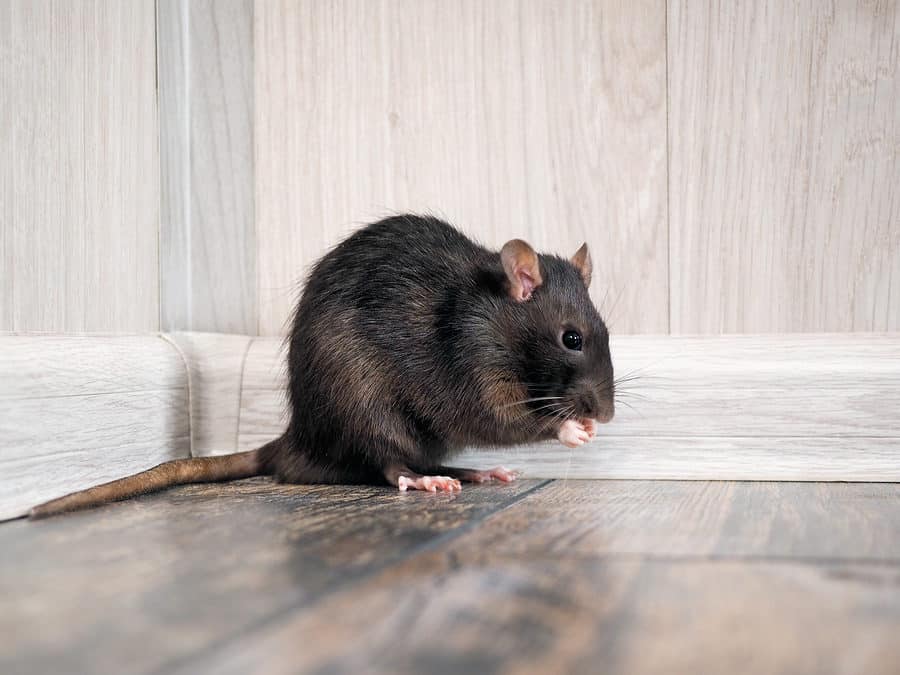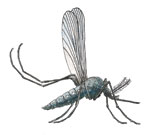READY TO GET STARTED?
REQUEST A FREE ESTIMATE
Fill out the form below or call (888) 466-7849 for a free, no-obligation estimate.

FACT. Rats are one of the most common pest issues homeowners face. Rats are known for being destructive by gnawing on structures in and around your home including utility pipes, wood structures, and wiring. In addition to the structural damage rats can cause, it is also possible for rats to pose serious health risks to humans. Diseases caused by rats can be transmitted through bites or scratches. Rat feces illness can be transmitted to humans through rat droppings and urine left around your home. Humans can also get sick through contaminated food caused by rats running across countertops where food is later prepared.
Just how sick can rats make you? Here are some common rat-borne diseases found in the United States.
Hantavirus pulmonary syndrome is a viral illness spread by deer mice, cotton rats, rice rats, and white-footed mice. HPS is spread by direct contact with rodents or their urine and feces, by breathing in dust contaminated with urine or droppings, or by bite wounds. Symptoms in the first phase of the virus include fatigue, fever, muscle aches, headache, dizziness, chills, nausea, vomiting, and abdominal pain. The symptoms then progress to coughing and shortness of breath. HPS is a severe and sometimes fatal respiratory disease with a 38% mortality rate. There is no specific treatment, cure, or vaccine for hantavirus infection.
Leptospirosis is a bacterial disease spread by rodents worldwide by either eating or drinking food and water contaminated with urine or contact through the skin or mucous membranes with water or soil that is contaminated with urine. Without treatment, leptospirosis can lead to kidney damage, meningitis (inflammation of the membrane around the brain and spinal cord), liver failure, respiratory distress, and even death. Common symptoms include fever, chills, headache, muscle aches, abdominal pain, vomiting, jaundice, diarrhea, and rash. The symptoms are often mistaken for other illnesses. If not treated, the second phase of symptoms includes kidney or liver failure or meningitis. The disease lasts between 1 and 3 weeks. Leptospirosis is treated with antibiotics.
Rat-bite fever is a bacterial illness spread by rats and possibly mice. The disease occurs worldwide and is spread through bites or scratches from an infected rodent, contact with a dead rodent, or eating or drinking food and water that is contaminated by rat feces. If not treated, RBF can be a serious or even fatal disease. RBF is not spread from one person to another. The early symptoms of RBF can be similar to the symptoms of other medical conditions. Common symptoms include fever, headache, muscle pain, headaches, vomiting, joint pain, and rash. If the illness progresses, more severe complication can arise such as abscesses, hepatitis, kidney infections, pneumonia, meningitis, or infections in the heart. RBF is treated with antibiotics.
Salmonellosis is a bacterial disease found worldwide that is spread by rats and mice. Salmonellosis is spread through eating or drinking food and water that is contaminated by rat feces. Salmonellosis is an infection caused by the Salmonella bacteria. Although commonly spread when a person eats contaminated food, the bacteria also can be passed between people and animals. Common symptoms include diarrhea, vomiting, fever, and abdominal cramps. Salmonella infections in people usually resolve within 5-7 days, and most do not require treatment other than drinking plenty of fluids. People with severe diarrhea may need to spend time in a hospital getting rehydrated with intravenous fluids.
Rat-borne diseases can cause serious and sometimes fatal illnesses in humans. The best way to avoid these diseases is to prevent rats from infesting your home in the first place. Here are some common home rat prevention tips:
Request a Free Wildlife Control Estimate
The Dos and Donts of Bird Nest Removal
When Should You Be Concerned About A Spider Bite?
Last week we saw cold weather and snow blanket much of the country. In cold conditions homeowners aren’t the only ones seeking shelter indoors. Northwest Exterminating warns that rodents and wildlife are also looking for a warm place, like our homes, to escape the winter chill. Unfortunately, these small pests can cause more than just a headache for homeowners if they gain entrance inside.
Rodents can contaminate food sources and serve as vectors of many diseases, such as salmonella and the potentially fatal Hantavirus. Moreover, mice and rats can cause serious structural damage by chewing through insulation, walls, wood, and electrical wiring.
It’s much easier to prevent an infestation than to get rid of pests after they’ve found a cozy retreat inside the home. The National Pest Management Association (NPMA) recommends the following tips to keep homes rodent-free this winter:
Northwest Exterminating advises homeowners to also be on the lookout for signs of an infestation. If you find rodent feces or hear sounds of scurrying in the walls or attic, contact a licensed pest professional, like Northwest Exterminating, to inspect your home for rodents.
For more information, visit https://www.callnorthwest.com/wildlife-control/.
If there was an award for “Most Annoying Bug” there is a good chance that the house fly would win!! House flies are the most common type of fly found in and around homes. The adults usually live between 15-25 days but when they’re flying around your head or your food…even 15-25 seconds is too long.
House flies don’t cause damage to your property and they don’t bite but they are known to transfer over 100 diseases including malaria, salmonella, and tuberculosis. They transfer diseases and contaminate our food when they land on food and other surfaces. So not only are they annoying but they are a sanitary issue too!
The best way to get rid of flies and ensure that they stay away is to keep things clean!
Preventing House Flies:
Want more information on flies? Click here!
 The early spring has brought pests out in full force and we suspect that they will not be slowing down anytime soon. Not only are bugs annoying but they’re a health concern as well.
The early spring has brought pests out in full force and we suspect that they will not be slowing down anytime soon. Not only are bugs annoying but they’re a health concern as well.
Pests can carry diseases and cause areas to be unsanitary. These are issues of concern for both homes and businesses. Even the cleanest homes can have bug problems in an environment like this. Carpenter bees, mosquitoes, ants, yellow jackets, silverfish, and other pests have recently been invading properties. If you’re in the Atlanta, Columbus, Savannah, or Nashville area, call Northwest Exterminating. Our NorPest Green program was developed exclusively by Northwest Exterminating to get rid of pests using the lowest environmental impact possible. A Northwest representative will develop a customized plan to target those pests while maintaining the health of your home.
We are strategically placed throughout Georgia and Tennessee to service all areas of Georgia as well as parts of Tennessee, Alabama, and South Carolina. Visit us online or call 888.466.7849 to find the location nearest you.